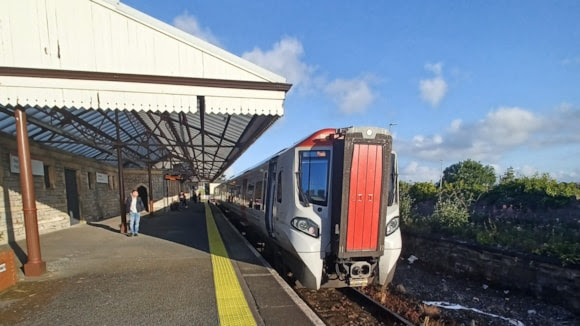News
Plaid Cymru calls for HS2 funding as disruption sparks debate

PLAID Cymru representatives have condemned the UK Government over the HS2 rail project, branding it the “Great Welsh Train Robbery”, while calls for a fairer funding settlement for Wales intensify. However, the UK Government insists that Wales benefits indirectly from the high-speed rail project, while the Welsh Labour Government faces questions about its role in addressing the issue.
Ann Davies, Plaid Cymru MP for Caerfyrddin and the party’s Westminster transport spokesperson, criticised the lack of funding for Wales as well as the expected disruption to Welsh rail passengers caused by the construction of Old Oak Common station.
Plaid Cymru’s frustration
Speaking in Westminster on Tuesday (Dec 17), Ms Davies said: “It is well documented that Wales is being robbed of £4 billion in consequential funding from HS2.”
She highlighted the disruption that will affect journeys on the Carmarthen-London route, with some trains expected to be diverted from London Paddington to Euston for up to seven years.
“Welsh passengers will be robbed of their time as trains could be diverted due to the construction of Old Oak Common. It is no wonder that HS2 is being referred to as the Great Welsh Train Robbery.”
Cefin Campbell MS, Plaid Cymru Senedd Member for Mid and West Wales, echoed her concerns:“Wales deserves better connectivity and transport links that serve her people. The Government must stop sidelining Wales and deliver the funding owed.”
UK Government’s response
The UK Government maintains that HS2, classified as an “England and Wales” project, provides indirect benefits to Wales. A spokesperson for the Department for Transport said:
“We are committed to improving services for rail passengers in Wales, investing a record-breaking £2bn in Welsh railways from April 2019 to March 2024. HS2 will deliver economic benefits to all parts of the UK, including Wales, by improving connectivity and reducing congestion.”
The Government argues that the improved rail capacity HS2 provides in England will create opportunities for better services across the wider network, indirectly benefitting Welsh passengers.
Questions for Welsh Labour
Plaid Cymru also criticised the Welsh Labour Government for failing to take a stronger stance. Ann Davies questioned whether the First Minister has made adequate representations to the UK Government about the disruption:
“Can the Minister set out what meetings he has had with the Welsh First Minister regarding the near decade of disruption facing Welsh passengers?”
However, the Welsh Government has consistently called for fairer funding. A spokesperson for the Welsh Government said:
“We continue to press the UK Government for a fair funding settlement that reflects the impact of HS2 on Wales and ensures investment in rail infrastructure.”
Funding disparity
Ann Davies MP also highlighted what she described as historical underinvestment in Wales:
“Despite having 5% of the UK population and 11% of track miles, Wales has received only 1-2% of rail enhancement funding in recent years. Electrification in Wales stands at just 7%, compared to 44% in England and 33% in Scotland.”
Transport experts have supported these concerns. Professor Mark Barry, an advisor to the Welsh Government, said:
“As it is now, we’re supporting a massive scheme in England with no benefit to Wales—and getting no funding. That’s outrageous.”
As disruption looms for Welsh passengers, commuters have expressed concern over overcrowded stations and longer journeys. Passengers travelling to London face diversions, with the situation expected to last up to seven years while construction at Old Oak Common continues.
Plaid Cymru has renewed its call for the UK Government to release the £4 billion it claims is owed to Wales, urging investment in better connectivity and infrastructure.
Cefin Campbell MS added: “The Government must alter its course, deliver the £4 billion Wales is owed, and ensure effective measures are in place to protect Welsh passengers from disruption.”
With the debate showing no signs of slowing, Welsh passengers and politicians alike will be watching closely to see whether funding and disruption concerns are addressed in the coming months.
Charity
Vincent Davies raises £13,682 for air ambulance charity

Independent Haverfordwest store backs lifesaving crews with year of community fundraising
A WEST WALES department store has raised more than thirteen thousand pounds for a lifesaving emergency service after a packed year of community fundraising.
Staff at Vincent Davies Department Store collected £13,682 for the Wales Air Ambulance Charity, after voting the organisation their Charity of the Year for 2025.
The independent retailer organised events throughout the year, including an Easter bingo, bake sales, quizzes, raffles, staff sales, Christmas jumper days and a festive wreath-making workshop. Charity jam jars placed in Café Vincent also helped gather steady donations from customers.
One of the most popular attractions was the store’s charity singing penguin trio, which drew smiles from shoppers of all ages and boosted collections.
Sarah John, Joint Managing Director at Vincent Davies, said: “Raising £13,682 for the Wales Air Ambulance Charity is something we are extremely proud of at Vincent Davies Department Store. As a director, it’s wonderful to see our community come together to support a charity that makes such a lifesaving difference.”
The air ambulance is consultant-led, delivering hospital-level treatment directly at the scene of serious incidents and, when needed, transferring patients straight to the most appropriate specialist hospital.
Working in partnership with the NHS through the Emergency Medical Retrieval and Transfer Service, crews can provide advanced critical care including anaesthesia, blood transfusions and even minor surgical procedures before reaching hospital.
Operating across the whole of Wales, its teams travel the length and breadth of the country by helicopter and rapid response vehicle to reach patients quickly in both rural and urban areas.
This is not the first time the Haverfordwest store has backed the cause. In 2016, staff previously raised £5,831 when the charity was also chosen as their beneficiary.
Mike May, the charity’s West Wales Regional Fundraising Manager, said: “We are so grateful to Vincent Davies Department Store for raising an incredible amount for our charity. Throughout the year they put on a variety of different events and what a successful fundraising year it was.
“The charity needs to raise £13 million every year to keep our helicopters in the air and our rapid response vehicles on the road. By raising £13,682, the staff and customers have played an important part in saving lives across Wales.”
The store says it will announce its Charity of the Year for 2026 in the coming weeks.
Crime
Police assess complaints over Mandelson–Epstein links

Met says allegations will be reviewed to see if criminal threshold is met following release of US court files
SCOTLAND YARD is reviewing a series of complaints alleging possible misconduct in public office after fresh claims emerged linking former UK ambassador Peter Mandelson to convicted sex offender Jeffrey Epstein.
The Metropolitan Police Service confirmed it has received “a number of reports” following the publication of millions of pages of material by the United States Department of Justice, and will now decide whether any alleged conduct reaches the level required for a criminal investigation.
Commander Ella Marriott said the force would assess each report individually, stressing that a review does not automatically lead to formal proceedings.
The documents, widely referred to as the “Epstein files”, appear to show Mandelson corresponding with Epstein while serving as business secretary during the government of Gordon Brown at the height of the global financial crisis.
According to reports, Epstein was allegedly given insight into internal policy discussions, including proposals around banker bonus taxes in 2009 and details of a eurozone bailout package shortly before it was announced publicly.
Payments questioned
Bank records cited in the US disclosure reportedly show payments totalling 75,000 US dollars made to Mandelson between 2003 and 2004. It is also claimed Epstein paid for an osteopathy course for Mandelson’s husband.
Mandelson has denied any wrongdoing and said he has “no record or recollection” of the alleged transfers.
On Sunday he resigned his membership of the Labour Party, saying he did not want his continued association to cause further difficulty for the party.
In interviews, he dismissed suggestions that Epstein influenced his decisions as a minister and said nothing in the released files pointed to criminality or misconduct on his part.
Pressure mounts
The political fallout has intensified, with Downing Street confirming Keir Starmer has asked Cabinet Secretary Chris Wormald to carry out an urgent review into Mandelson’s historic contacts with Epstein while in office.
Brown has also called for an examination of whether any confidential or market-sensitive information was improperly shared during the financial crisis.
The case is the latest in a series of controversies linked to Epstein’s long-standing relationships with powerful figures on both sides of the Atlantic.
Police emphasised that no charges have been brought and that Mandelson is not currently under criminal investigation, but said the complaints process would be handled “thoroughly and impartially”.
Community
Councillor meets chief constable to address Monkton and Pembroke concerns

COUNTY COUNCILLOR Jonathan Grimes has met with the new Chief Constable of Dyfed-Powys Police to discuss crime, antisocial behaviour and wider community issues affecting residents in Pembroke and Monkton.
Cllr Grimes, who represents Pembroke St Mary South and Monkton, said the meeting followed his invitation for senior police leaders to visit the area and hear first-hand about local concerns.
The Chief Constable, Ifan Charles, attended alongside officers from the Pembroke Neighbourhood Policing and Protection Team, meeting the councillor in Monkton for what were described as open and constructive talks.
As part of the visit, they also spoke with Monkton Priory Community Primary School headteacher Dylan Lawrence and Danny Nash from Pembrokeshire County Council Housing Services to gather views from education and housing professionals.
Discussions covered a range of issues raised by residents, including domestic abuse, drug and alcohol misuse, antisocial behaviour and environmental concerns such as littering, dog fouling and dangerous or inconsiderate driving.
Cllr Grimes acknowledged recent police successes, particularly in tackling drug-related activity, but said enforcement alone would not solve the area’s challenges.
He said closer cooperation between the police, council services, schools and the wider community would be needed to deliver longer-term improvements.
The councillor added that he plans to encourage residents to form a local community group in the coming weeks, aimed at developing practical solutions and strengthening partnership working across the area.
-

 Health5 days ago
Health5 days agoConsultation reveals lack of public trust in health board
-

 News6 days ago
News6 days agoCaldey still unsafe, survivors warn — despite Abbey’s reform claims
-

 Community5 days ago
Community5 days agoPembrokeshire students speak at national Holocaust Memorial Day event
-

 News6 days ago
News6 days agoKurtz raises Gumfreston flooding in the Senedd as petition deadline nears
-

 Entertainment7 days ago
Entertainment7 days agoRapunzel brings festive magic to Torch Theatre
-

 Crime7 days ago
Crime7 days agoMan denies murdering brother as jury hears of ‘ferocious attack’ at Morriston flat
-

 Community7 days ago
Community7 days agoStorm Chandra: Morning impacts across Pembrokeshire
-

 Education5 days ago
Education5 days ago‘Vulnerable teen’ questioned by police at Milford Haven School


























